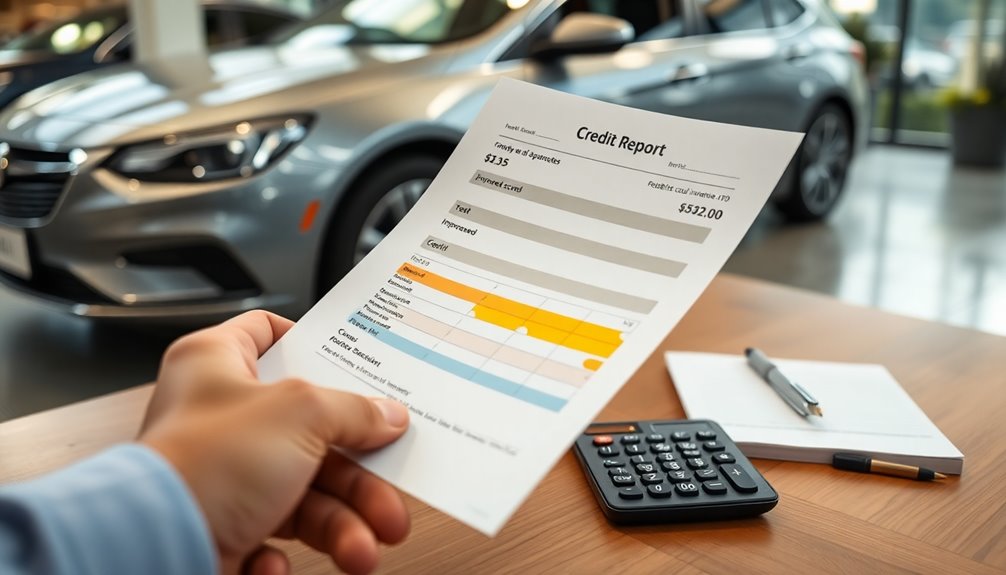Leasing a car with bad credit and no cosigner might seem tough, but you can make it work. Start by understanding your credit situation and fix any errors on your report. Saving for a larger down payment can improve your chances, too. Explore leasing options, like used cars or specialty dealerships that cater to customers with bad credit. Focus on lowering your debt-to-income ratio by managing existing debts. Keep an eye out for lease transfer opportunities that involve less scrutiny. Ultimately, focus on improving your credit score over time. You'll discover more helpful strategies as you move forward.
Key Takeaways
- Review and improve your credit score by disputing errors and managing existing debts effectively.
- Save for a larger down payment to reduce monthly payments and demonstrate financial commitment.
- Explore lease transfer opportunities to take advantage of better rates and existing leases with fewer credit checks.
- Research dealerships that specialize in working with customers with bad credit for favorable lease terms.
- Consider leasing used cars, which typically result in lower monthly payments compared to new vehicles.
Understand Your Credit Situation
Understanding your credit situation is essential before you lease a car. Your credit score directly impacts lease approval and the terms you'll receive. The average score for new vehicle leases is around 751, so knowing where you stand is vital. Start by obtaining and reviewing your credit report. Look for errors or inaccuracies; disputing these can lead to quick improvements in your score and enhance your leasing opportunities.
Leasing companies assess your credit history to determine credit risk. If you have limited or bad credit, expect larger down payments and higher monthly payments. While there's no strict minimum credit score for leasing, a prime score typically starts at 661. Lower scores often mean more challenges in securing favorable terms.
Don't forget that your overall financial health matters too. Factors like income, employment history, and existing debt obligations play a significant role in lease approval beyond just your credit score.
Save for a Larger Down Payment

Saving for a larger down payment can make a significant difference when leasing a car with bad credit. By putting down around 20% of the vehicle's value, you can substantially reduce the overall lease amount and lower monthly payments. This strategy helps you manage costs more effectively, even with higher interest rates that often come with bad credit leases.
When you offer a larger down payment, you show a financial commitment to the dealer. This can improve your chances of lease approval, despite your low credit score. A higher down payment can also reduce the money factor, which is fundamentally the interest rate on your lease, leading to better lease terms and lower overall costs.
Additionally, accumulating a larger down payment gives you leverage during negotiations. With more money upfront, you can seek more favorable lease terms and better vehicle options.
In short, saving for a larger down payment not only mitigates costs but also enhances your position as a lessee, paving the way for a more manageable and rewarding leasing experience.
Explore Leasing Options

When you're leasing a car with bad credit, exploring alternative leasing options can open up more possibilities.
You might consider lease transfer opportunities, where you take over someone else's lease, often at a better rate.
Don't hesitate to research and find the best fit for your needs and budget.
Alternative Leasing Options
Finding alternative leasing options can make a significant difference for those with bad credit. One effective strategy is to contemplate leasing a used car. Used cars often come with more affordable deals and lower monthly payments, which can ease the financial burden. Additionally, it's important to understand that interest rates on leases can vary, influencing the overall cost of leasing a vehicle.
Additionally, explore leasing companies that specialize in bad credit or no credit situations. These companies may offer more flexible terms and quicker approval processes. Manufacturer-sponsored lease deals can also be beneficial, as they might have less stringent credit requirements, leading to better leasing opportunities. It's also important to be aware of tax implications that could affect your overall financial planning when considering different leasing options.
Here's a quick overview of alternative leasing options:
| Option | Benefits | Considerations |
|---|---|---|
| Used Car Leasing | Lower monthly payments, affordable deals | Limited selection |
| Subprime Leasing | Tailored financing solutions | Potentially higher interest rates |
| Manufacturer-Sponsored Lease | Less stringent credit requirements | Availability may vary
Lease Transfer Opportunities
Lease transfer opportunities can be a smart way to secure a vehicle without the hassle of starting a new lease, especially if you have bad credit. By choosing to assume an existing lease, you often gain access to more favorable terms than you'd with a new lease agreement.
Platforms like SwapALease and LeaseTrader make it easier to connect with individuals looking to get out of their leases, allowing you to step in without facing high upfront payments.
While transferring a lease typically involves a transfer fee, it can help you avoid the common credit checks associated with new leases. This can be particularly advantageous for those with bad credit, as lease transfers often require less stringent credit evaluations.
Before proceeding, be sure to review the original lease terms to understand any remaining obligations, including mileage limits and fees linked to the transfer.
In essence, lease transfer opportunities provide a feasible path to driving a vehicle that suits your needs without the burden of starting from scratch.
Explore these options to find a deal that works for you!
Improve Your Debt-to-Income Ratio

To improve your debt-to-income (DTI) ratio, focus on reducing your existing debts and increasing your income. A lower DTI, ideally below 36%, enhances your financial profile, making you more appealing to lenders when leasing a car.
Start by paying off high-interest debts, which can greatly decrease your DTI and demonstrate your ability to manage expenses. This not only helps with lease approval but also boosts your overall financial health.
Consider finding additional income sources, like a side job or freelance work, to further lower your DTI. Aim to keep your monthly debt obligations, including loans and credit card payments, below 28% of your gross monthly income. This strategy enhances your leasing prospects and provides a stronger position in negotiations.
Regularly reviewing and adjusting your budget is essential. Identify and eliminate unnecessary expenses, allowing you to allocate more resources towards paying off debts.
By actively managing your income and expenses, you'll create a favorable DTI ratio, improving your chances of successfully leasing a car, even with bad credit.
Research Reliable Dealerships

A reliable dealership can make a significant difference when you're looking to lease a car with bad credit. Start by searching for dealerships that specifically advertise their willingness to work with customers like you. These reliable dealerships often have tailored programs and flexible leasing options designed to accommodate your situation.
Make certain the dealership has a transparent online presence. Look for clear information about their inventory, financing options, and the leasing process. This kind of transparency helps you make informed decisions. Checking customer reviews on platforms like Google or Yelp can also provide insight into other clients' experiences, helping you identify which dealerships are truly reliable.
When you're evaluating options, verify the dealership offers a diverse inventory of vehicles. A wider selection increases your chances of finding a vehicle that fits your needs and possibly better lease terms, even with bad credit.
Consider Lease Transfer Opportunities

If you're struggling with bad credit, consider taking over an existing lease through a lease transfer.
This can offer you better terms and lower monthly payments without the hassle of a credit check.
Platforms like SwapALease.com make it easy to find these opportunities, helping you secure a vehicle that fits your budget.
Benefits of Lease Transfers
Lease transfers can be a smart solution for individuals facing the challenges of bad credit. By taking over existing lease agreements, you often enjoy lower monthly payments and more favorable lease terms compared to starting a new lease. Platforms like SwapALease make it easy to find these opportunities.
| Benefit | Details | Why it Matters |
|---|---|---|
| Lower Monthly Payments | Assume an existing lease with potentially reduced rates | Saves money, making leasing affordable |
| Less Scrutiny | Fewer credit checks compared to new leases | Easier approval for those with bad credit |
| Newer Model Vehicle | Drive a vehicle that's often newer and less depreciated | Enjoy modern features without high costs |
| Flexibility | Choose lease duration and mileage allowances | Tailors to your specific needs |
Assuming a lease can give you access to a newer model vehicle while mitigating some of the challenges that come with bad credit. Plus, the flexibility in mileage and lease duration can align with your lifestyle, making lease transfers a viable option for many. Additionally, lease transfers often come with lower upfront costs, making them an attractive option for those with financial constraints.
How to Find Transfers
Finding lease transfer opportunities can be a game changer for those with bad credit. By taking over an existing lease, you can potentially avoid high upfront costs and secure more manageable monthly payments.
Websites like SwapALease and LeaseTrader are excellent resources for connecting with individuals looking to transfer leases. These platforms create a marketplace where you can find various transfer opportunities tailored to your needs.
Often, lease transfers come with incentives, such as reduced down payments or lower monthly payments, making them an attractive option for those struggling with credit.
However, it's essential to review the lease agreement of the vehicle being transferred. Understanding any fees, mileage limits, or remaining obligations can help prevent surprises down the road.
Most leasing companies allow lease transfers, but each has specific policies regarding the process. Make sure to verify the leaseholder's rules to guarantee a smooth transfer process.
Focus on Credit Score Improvement

Improving your credit score can greatly enhance your chances of successfully leasing a car, especially if you've faced challenges in the past. Start by regularly checking your credit report for inaccuracies. Correcting errors can lead to quick improvements in your credit score.
Additionally, report your monthly rent and utility payments; these consistent on-time payments show reliability to credit bureaus. This is important because credit utilization ratio plays a significant role in your overall credit score. Maintaining a diversified investment strategy can also contribute to long-term financial health, which indirectly supports creditworthiness.
To further improve your credit, focus on reducing overall debt. Pay off existing loans to enhance both your credit score and debt-to-income ratio, making you a more appealing candidate for leasing.
Using secured credit cards responsibly can also help. Timely payments on these cards contribute positively to your credit history.
Another effective strategy is to request credit limit increases. This can lower your credit utilization ratio, a key factor in credit scoring. The lower your utilization ratio, the better your credit score can be over time.
By actively engaging in these habits, not only do you work towards improving your credit score, but you also set yourself up for better leasing options, even with bad credit. Additionally, understanding the importance of diversification in your financial planning can provide a more stable foundation for your future financial endeavors.
Stay committed, and you'll see results that can pave the way for a successful lease.
Frequently Asked Questions
What Credit Score Is Needed to Lease a Car Without a Co-Signer?
To lease a car without a co-signer, you'll typically need a credit score of around 661 or higher for favorable terms.
While there's no strict minimum, scores below 661 can limit your options and lead to higher costs.
Leasing companies evaluate your overall financial profile, so having a stable income and low debt-to-income ratio can help improve your chances of getting approved for a lease, even with a lower credit score.
Can You Lease a Car With a 500 Credit Score?
Sure, you can lease a car with a 500 credit score—if you enjoy the thrill of paying exorbitant rates!
Most dealerships see your score and treat you like a financial pariah. They'll throw in hefty down payments and limited options, making you feel like you're on a budget safari.
To boost your chances, consider saving for a larger down payment and find dealerships that specialize in working with folks like you.
Good luck!
How to Get a Car With Bad Credit and No Cosigner?
If you're trying to get a car with bad credit and no cosigner, start by saving for a larger down payment. This shows lenders you're serious and can lower your monthly payments.
You should also demonstrate stable income and a solid employment history, as these factors can help your case.
Look into subprime leasing options or dealerships that cater to individuals with poor credit, and consider taking over an existing lease for better terms.
Can I Lease a Car With Bad Credit and a Co-Signer?
Did you know that nearly 30% of Americans have a credit score below 601?
If you're wondering if you can lease a car with bad credit and a co-signer, the answer is yes! Having a co-signer can greatly improve your chances of approval and even lower your monthly payments.
Just remember, both you and your co-signer are responsible for the lease, so timely payments are essential to protect both your credit scores.
Conclusion
Leasing a car with bad credit and no cosigner may seem challenging, but it's entirely possible with the right approach. By understanding your credit situation and taking proactive steps, you can open the door to better leasing options. Remember, every journey begins with a single step; so, save for that larger down payment, improve your financial health, and research reliable dealerships. With perseverance and a positive mindset, you can drive away in your dream car sooner than you think!










